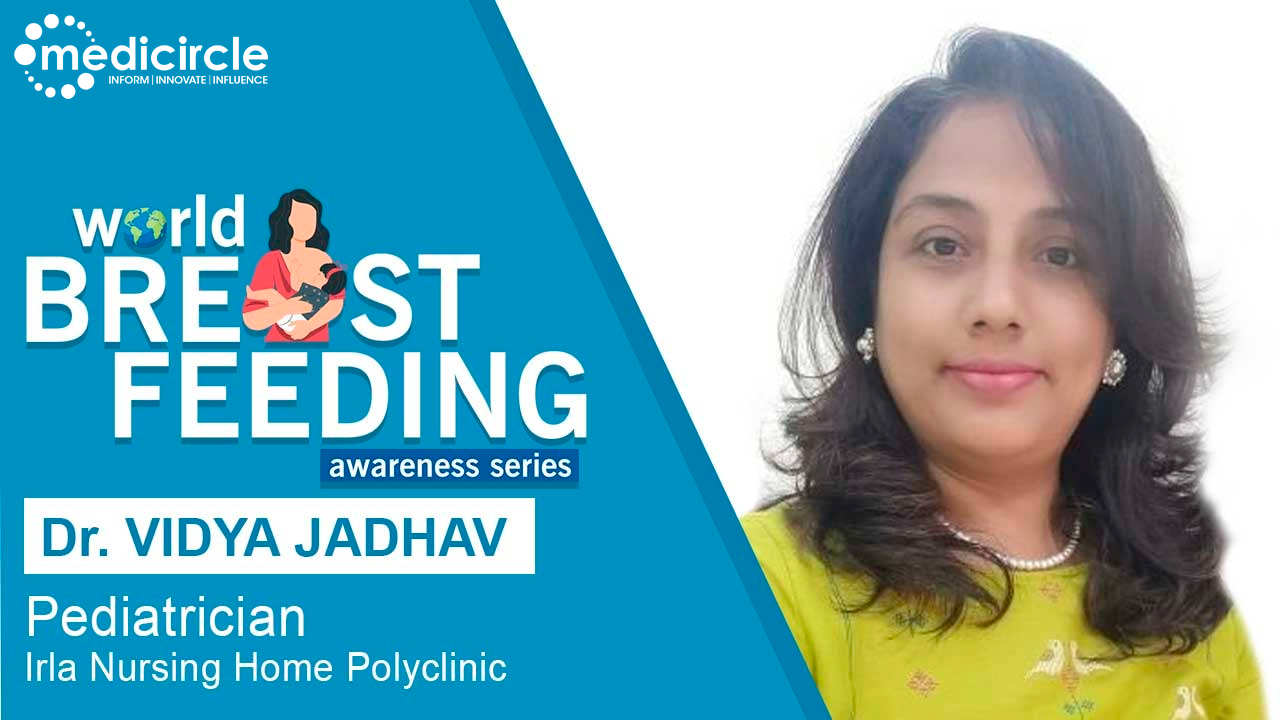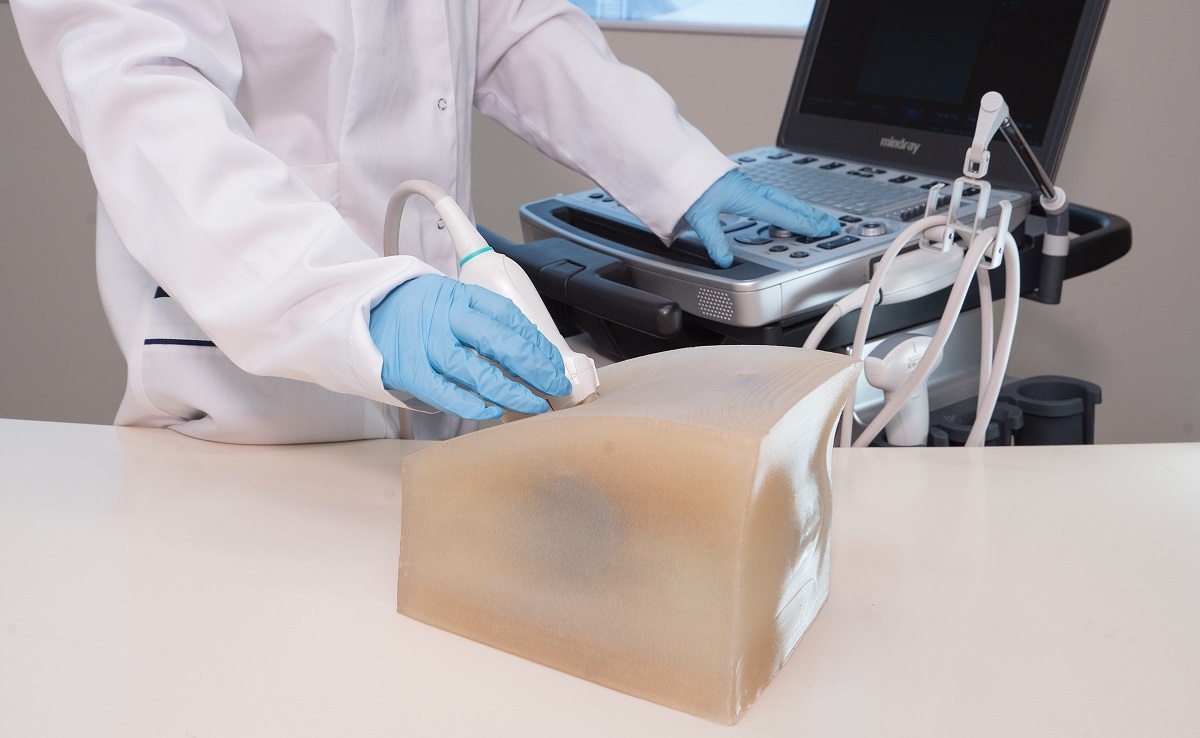World Breast Week (WBW) is celebrated every 1st -7th August in commemoration of the 1990 Innocenti Declaration. WBW started in the year 1992, with annual themes including healthcare systems, women and work, etc. It is a global campaign to raise awareness and galvanize action on themes related to breastfeeding. The body can develop in a better way when Qualitative and better Milk is given to the Babies. One has to do many of the activities to achieve their goals in the future. To make the Baby more sharp, intelligent, and strong enough to tackle and handle all the activities properly, every mother has to develop their mind to focus and concentrate on giving every small child mother’s milk. Medicircle is conducting a series on this occasion to spread awareness about the virtues of breastfeeding for both the mother and the child by speaking to experts.
Dr. Vidya Jadhav is Paediatrician and International board-certified Lactation Consultant. She has been practicing Paediatrics and lactation for the last 14 years. She is the Assistant Professor Paediatrics visiting faculty Expert in Sia College of Medical science and Physiotherapy, Dombivali. She is also a medical blogger and has written articles on various platforms regarding breastfeeding.
Breastfeeding – Tips and facts
Dr. Vidya mentions, “Every baby has a different feeding need. The stomach of a newborn baby is almost equivalent to a cherry. The first milk that a mother secretes just after the delivery is called colostrum, it is the richest source of all essential nutrients that are very much helpful in a child's overall growth. Colostrum is also rich in antibodies that can easily prevent diarrhea. The amount of colostrum secreted is very little but is enough to provide essential nutrients to the baby. Colostrum acts as the first vaccine against various diseases for the newborn baby.
Dr. Vidya says, “Mother should understand the cycle of feeding. Feeding on demand simply means feeding your baby whenever he signals that he's hungry – usually by crying or sucking on his hands – rather than according to a set schedule. Milk production starts increasing as the frequency of feeding increases. A mother should feed her newborn 8-12 times in 24 hours. Feeding at night is also important as the hormone prolactin is released which helps in maintaining consistent production of milk. Mother's milk is easily digestible; thus, new-born need to be breastfed every 1.5 – 2 hours. As the infant grows, the gap between two sessions of feeding also increases. Until 6 months, mothers should offer exclusive breastfeed to their newborns. She should breastfeed fully till the baby gets satisfied. Milk has two components – foremilk is more of water that fulfills the baby's thirst and hindmilk is a little thicker, is full of calories and nutrients that help in the weight gain of infants. Mother should breastfeed for at least 15-20 minutes in one feeding session in the early days. The baby should pass 7-8 times urine and 4-5 times stools in 24 hours. The baby's weight should increase as the month passes. This ensures the actual developmental growth."
"After 6 months, the mother should include complimentary food along with breastfeeding. Complimentary food should be fresh soft meshy food made at home. You should feed the newborn as per their requirements or when needed.”
Diet for breastfeeding mothers
Dr. Vidya explains, "Breastfeeding helps in losing excess weight which mothers might have gained during their pregnancy period. A mother should intake 550-600 extra calories through her food. This also depends on her age, physical activity, and the number of times she breastfeeds.
2-3 servings of proteins should be included in the diet per day. Vegetarian mothers can take nuts, seeds, dairy products for this. Nonveg mothers can include meat, fish, poultry, and eggs. A mother should have 2-3 servings of vegetables, especially dark green and yellow colored vegetables which are rich in iron and multivitamins. Two servings of fruits are a must. Whole wheat roti, oatmeal, cereals tend to increase milk production. Drink limited water only to satisfy your thirst. A well-balanced diet along with physical exercise will help in the production of nutritious milk that is required for your baby's growth and development. Psychology plays a very essential role in increasing milk supply. Family should keep breastfeeding mothers happy by supporting her in her household chaos. Mother should eat seasonal fruits and vegetables and shouldn’t go for exotic ones.”
Breastfeeding - Tips for working mothers
Dr. Vidya emphasizes, “Mothers are also trained to express their milk either by her hands or through breast pump. She can do this 8-10 times in a day or frequently as and when required. This prevents problems of breast engorgement, pus formation, and other infections. By expressing milk, the supply of milk in the breast is also maintained. While expressing milk, she should maintain proper hand hygiene. After expressing milk, she or family members can feed the baby with a bowl and spoon."
Dr. Vidya advises, "Working mothers can easily express milk in a separate section (room) of their office. Firstly, the mother has to wash her hands properly before expressing and then store the expressed milk in a refrigerator. While going home, she can carry this milk in an ice carrier. If stored properly, this milk can be used for 2-3 days. By hand expression, she can avoid problems of engorgement, can maintain milk production and also nourish her baby simultaneously.”
Breastfeeding with COVID infection
Dr. Vidya expresses, "As per the research, active virus of COVID 19 has not been detected in breast milk. There are fewer chances of transmitting infection through breast milk. Even live antibodies of various infections are found in breast milk which gets transfer through milk to their babies. This protects the baby much more. Mothers can continue breastfeeding even though she has tested positive for COVID with little precautions –
Frequently wash your hands with soap and water or 60% alcohol-based sanitizer before touching or feeding the baby. Wear a surgical mask, double mask while touching or feeding a baby especially when a mother is very close to the baby. Use tissue paper to sneeze or cough and then discard it in a closed dustbin and sanitize your hands properly. Frequently clean often touched surfaces or floors. There is no need to clean or wash breast for every feeding. You can do only if cough droplets have fallen over it or occasionally. Sterilization of equipment or utensils like breast pumps, bowls, the spoon is also important.
(Edited by Renu Gupta)

 “Colostrum is the richest source of all essential nutrients that are very much helpful in a child's overall growth. Being infected with COVID, mothers can breastfeed their babies as it is safe. They can continue breastfeeding their newborn with some precautionary measures,†Dr. Vidya Jadhav, Paediatrician and Lactation Consultant
“Colostrum is the richest source of all essential nutrients that are very much helpful in a child's overall growth. Being infected with COVID, mothers can breastfeed their babies as it is safe. They can continue breastfeeding their newborn with some precautionary measures,†Dr. Vidya Jadhav, Paediatrician and Lactation Consultant










.jpeg)

.png)
.png)

.png)
.png)
.png)

.png)
.png)
.png)

.png)
.png)
.png)

.png)
.png)
.png)

